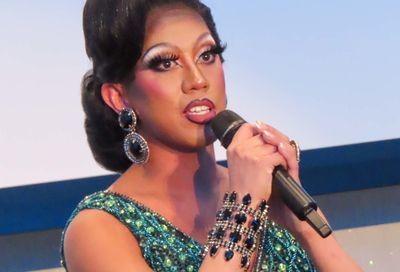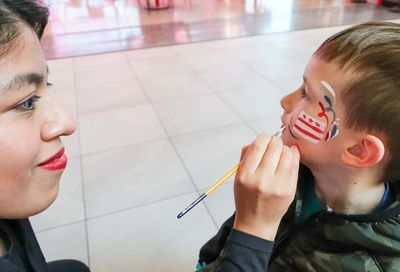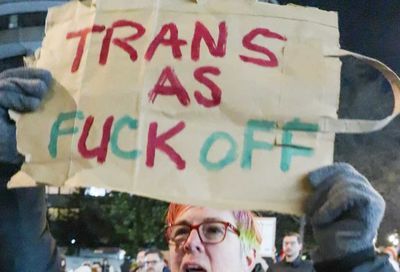A proposed law in Ghana would jail people who advocate for LGTBQ equality for up to 10 years
Bill would encourage Ghanaians to report their neighbors to authorities for any suspected same-sex activity or pro-LGBTQ advocacy.

A proposed law in Ghana would impose harsher penalties than those already in place for identifying as LGBTQ or an ally, and would imprison anybody found guilty of expressing support for LGBTQ equality or civil rights.
Same-sex relations are already criminalized in the West African nation, with a guilty verdict carrying a three-year prison sentence. But the new law would impose a sentence of five years for anyone identifying as lesbian, gay, bisexual, transgender, pansexual, nonbinary, queer, an ally “or any other sexual or gender identity that is contrary to the binary categories of male and female.”
The proposed law would also impose a sentence of up to 10 years in prison for anyone who advocates for LGBTQ rights — whether through speech, printed material, electronic media or any other means.
The Promotion of Proper Human Sexual Rights and Ghanaian Family Values Bill also bans same-sex marriage, same-sex adoption, the formation of LGBTQ-focused organizations, and gender-affirming surgery — “except where the procedure is intended to correct a biological anomaly including intersex,” reports NBC News.
Gross indecency, which, under the bill, includes dressing in clothing that does not match one’s assigned sex at birth or public displays of same-sex affection would be considered a misdemeanor and carry a jail sentence of between six months and a year.
Rightify Ghana, a local LGBTQ group, has called the measure “a homophobe’s dream law,” tweeting that the bill’s provisions combine some of the worst aspects of anti-LGBTQ laws seen in other nations, including Russia, Uganda, and Nigeria.
“It’s the worst anti-LGBTQ bill ever,” the organization tweeted in a thread explaining every section of the bill.
“The community is shocked at how wide-ranging it is,” Danny Bediako, of Rightify Ghana, said of the bill. “People are even scared to go out now and some members say they will leave the country if the bill is passed into law. Even those who want to help us will be afraid.”
On Monday, the bill was presented to the speaker in parliament, and still has to go through a multi-step legislative process, but some advocates worry that the bill — even with its most egregious provisions intact — enjoys broad support in parliament due to the outsized influence of religious communities, particularly in President Nana Addo Dankwa Akufo-Addo’s New Patriotic Party.
Under the bill, residents are expected to surveil and report suspected homosexual activity or advocacy to the authorities, but the bill allows for “flexible sentencing for any individual who “openly recants and requests access to approved medical help” — which critics contend is a reference to conversion therapy, which has been labeled ineffective by most medical and mental health experts.
Under other parts of the bill, anal and oral sex are banned — regardless of the sexual orientation of the participants, as are the use of sex toys, “intentional cross-dressing” and displays of affection by people of the same-sex in public.
The bill even amends Ghana’s existing extradition law to allow for the deportation of LGBTQ Ghanaians living overseas, meaning individuals who fled persecution will be targeted for death if the host countries comply with sending them back to Ghana.
Another provision in the bill would make the verbal or physical assault of people “suffering from any gender or sexual identity challenge under the bill” a misdemeanor, but LGBTQ advocates say that provision is window dressing to make the anti-LGBTQ bill more palatable and unlikely to be seriously enforced.
The sponsors “attempt to present a section that prohibits abuse and violence against accused LGBT persons,” Rightify Ghana wrote in a lengthy July 23 Twitter thread. “As if they care about people.”
Rightify Ghana also argued that the bill infringes on freedom of speech and expression, freedom of association, freedom of assembly, the right to dignity, and the right to personal and bodily privacy, in order to discourage any acknowledgment or mention of homosexuality, under the auspices that children must be “protected” from such knowledge or information, even in passing.
Rightify Ghana claims the measure was “imported” by the U.S.-based World Congress of Families, which has been designated as an anti-LGBTQ hate group by the Southern Poverty Law Center and is affiliated with the International Organization for the Family.
The assertion turns on its head the oft-repeated assertion by African religious leaders that homosexuality has been “imported” by Western nations seeking to undermine African society and families, despite the fact that many African countries’ laws, including Ghana’s, are derived from colonial laws imposed by European powers.
When asked by NBC News if the World Congress for Families was involved with drafting the legislation, Brian Brown, the president of the International Organization for the Family, refused to answer, instead accusing LGBTQ advocates of being part of a “neo-colonial movement to turn Africa into a carbon-copy of San Francisco.”
The bill’s introduction was fueled, in part, due to a backlash from the opening of the country’s first LGBTQ community center in the city of Accra earlier this year, despite protests from neighbors, politicians, and religious leaders. In January, just a few weeks after opening, the center was raided and forced to close for good.
See also: Laws criminalizing homosexuality increase risk of gay men getting HIV
Similarly, in May, LGBTQ activists were arrested for attending a human rights advocacy training session in the southern city of Ho. Police claimed the gathering was unlawful, even though the country’s constitution claims to allow freedom of assembly and association. Victor Madrigal-Borloz, the U.N.’s independent expert on sexual orientation and gender identity, later condemned the arrests as a violation of international human rights laws.
Advocates have launched a social media campaign called #KillTheBill and an online petition to raise awarenes of the proposed law and prevent it from being passed. Thus far, the petition has garnered slightly more than 4,000 signatures.
According to Reuters, political analysts say there is enough cross-party support in the largely conservative Christian nation for the bill to become law. However, the law’s constitutionality is likely to be challenged if it passes, and passage could be delayed if international donors or foreign partners attempt to intervene.
The bill now heads to committee, where it will be reviewed before being presented to parliament for a second reading and debate, where opponents will introduce amendments to try and dilute or repeal some of the law’s more egregious provisions.
See also:
People stood and laughed while a gay couple was attacked on a busy street
Spanish court sides with bisexual man sued by ex-wife for “hiding his homosexuality”
Palm Springs cannabis dispensary blocked trans man from restroom, questioned his “male parts”
Support Metro Weekly’s Journalism
These are challenging times for news organizations. And yet it’s crucial we stay active and provide vital resources and information to both our local readers and the world. So won’t you please take a moment and consider supporting Metro Weekly with a membership? For as little as $5 a month, you can help ensure Metro Weekly magazine and MetroWeekly.com remain free, viable resources as we provide the best, most diverse, culturally-resonant LGBTQ coverage in both the D.C. region and around the world. Memberships come with exclusive perks and discounts, your own personal digital delivery of each week’s magazine (and an archive), access to our Member's Lounge when it launches this fall, and exclusive members-only items like Metro Weekly Membership Mugs and Tote Bags! Check out all our membership levels here and please join us today!
























You must be logged in to post a comment.